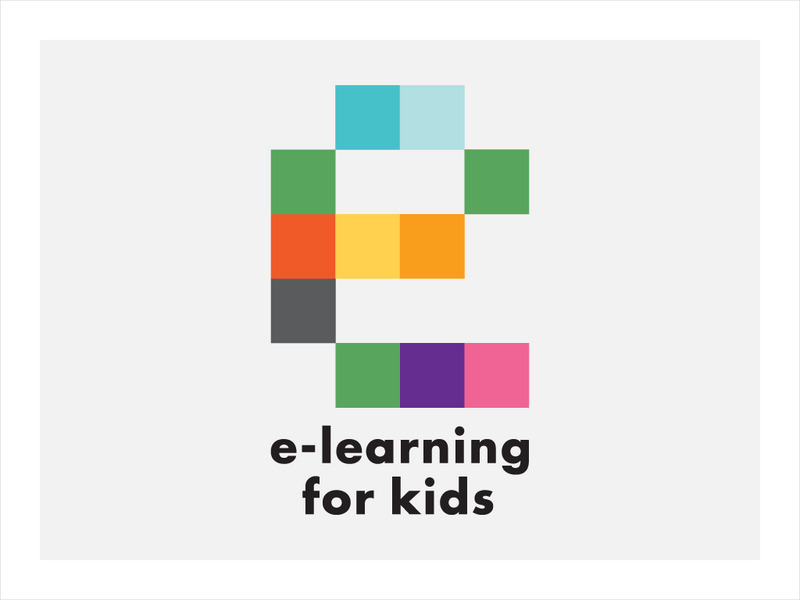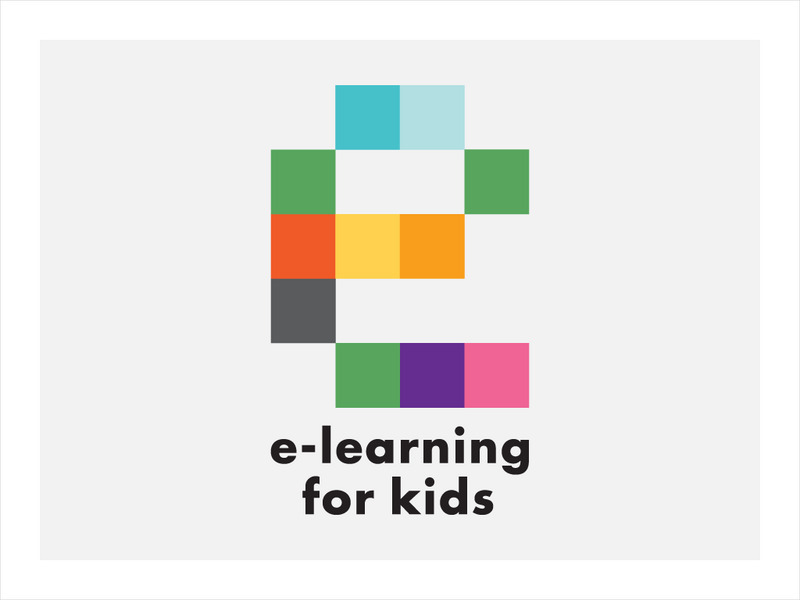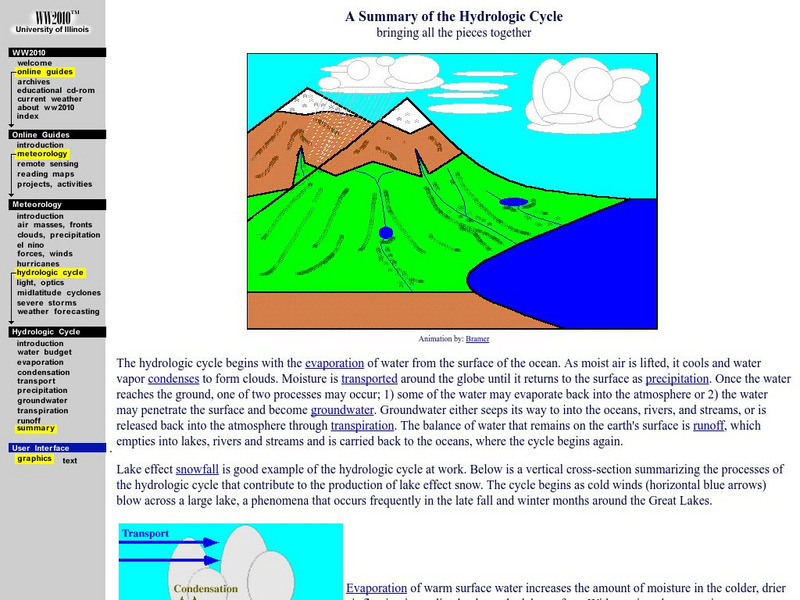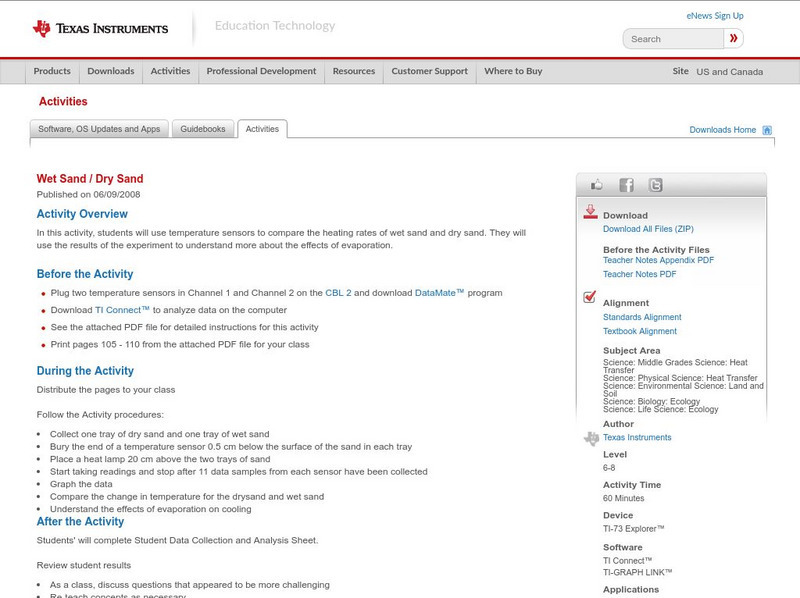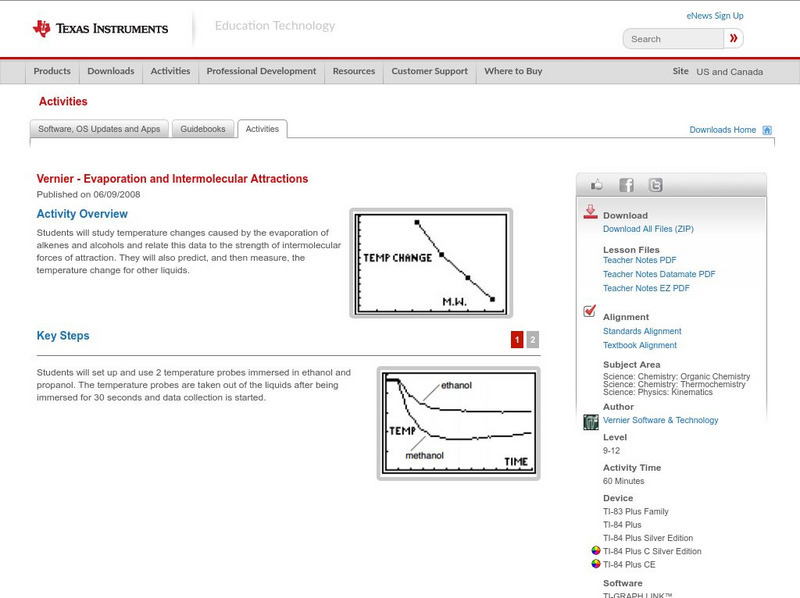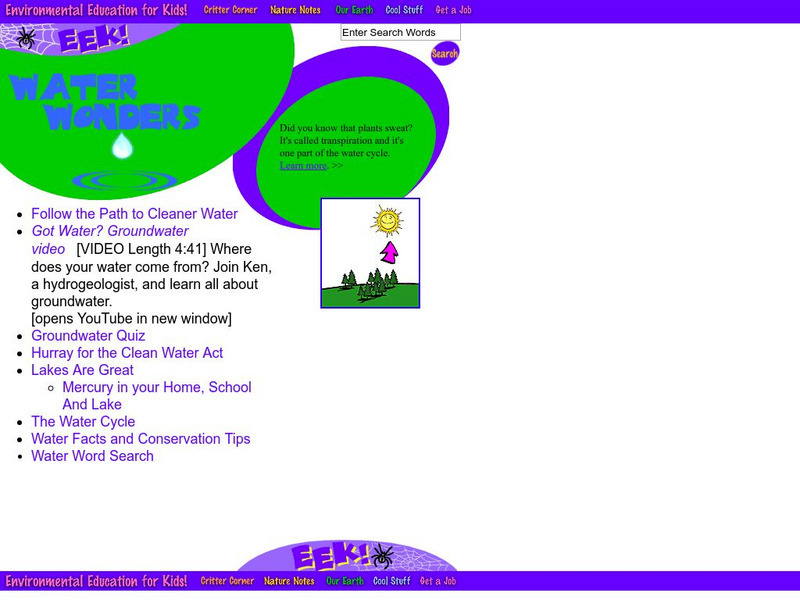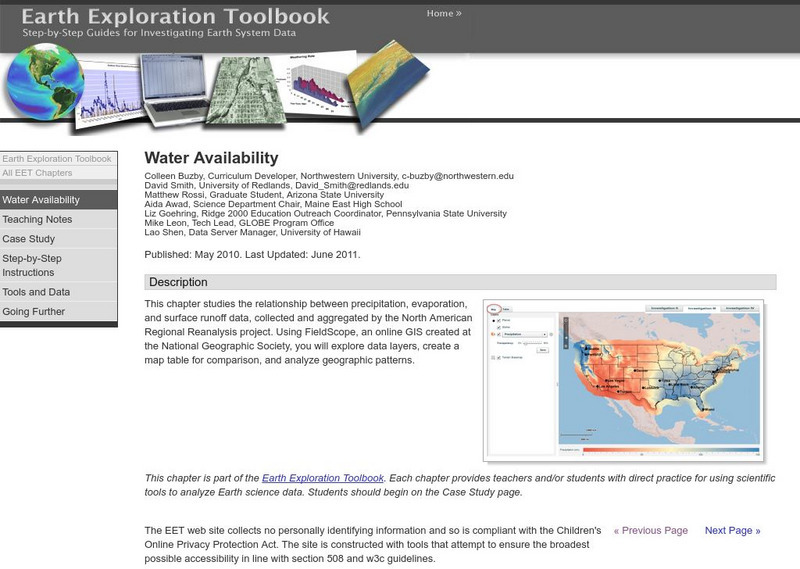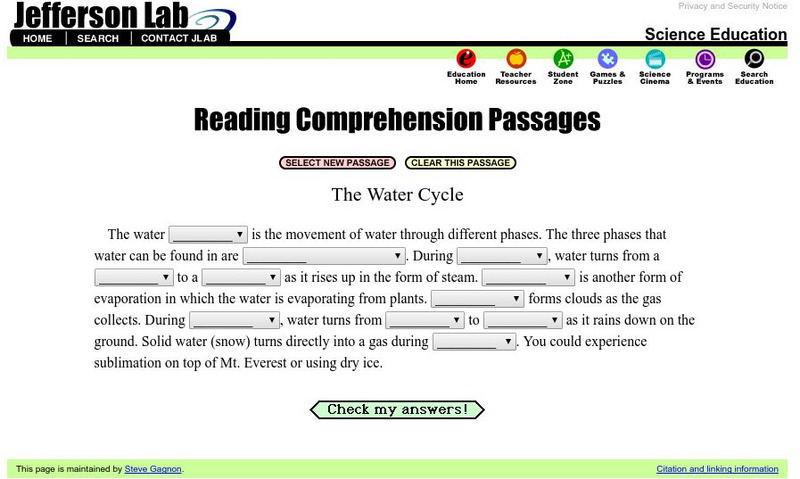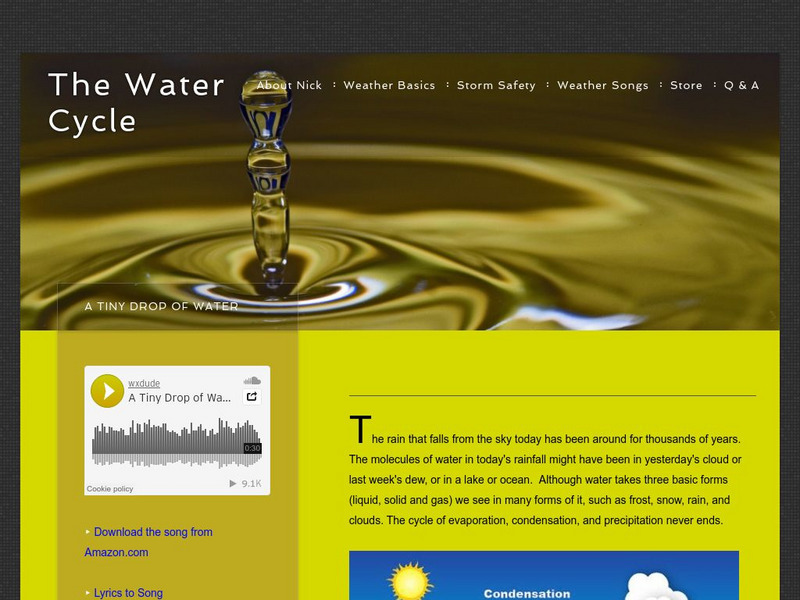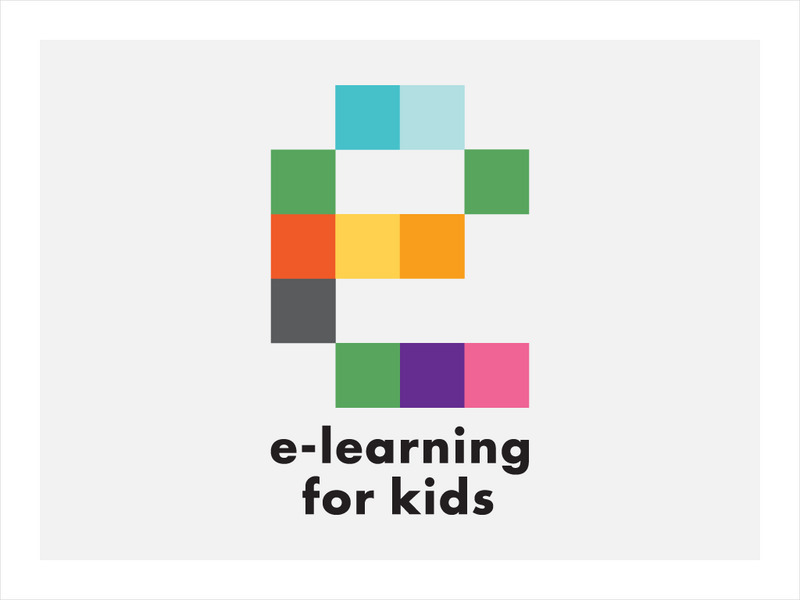Carnegie Mellon University
Carnegie Mellon: Vapor Pressure Tank
Basic design of a demonstration machine that will lower the vapor pressure and cause water to evaporate at room temperature.
Concord Consortium
Concord Consortium: Molecular Workbench Showcase: Chemistry, Vapor Pressure
A series of virtual experiments that show students the power and importance of evaporation.
McREL International
Mc Rel: Water Cycle [Pdf]
An assessment question requiring knowledge of the water cycle with the opportunity to use application skills.
E-learning for Kids
E Learning for Kids: Science: Atlantic Ocean: What Is Evaporation?
Explore with Julia how wind speed and temperature affect evaporation rate.
E-learning for Kids
E Learning for Kids: Science: Bermuda Triangle: What Is Condensation?
Cindy is at the beach learning a lot about water. Join her to explore the water cycle.
E-learning for Kids
E Learning for Kids: Science: Rio De Janeiro Carnival: What Is Boiling?
Ready for the carnival? First, help Joao get ready for his test about the water cycle, and then explore other water cycle processes.
New York University
Nyu: Welcome to Water
Educational resource invites users to understand the properties of water by first examining what water is and how we use it and then leads users to further information on the three states that water can exist.
University of Illinois
University of Illinois Urbana Champaign: A Summary of the Hydrologic Cycle
Animation and text explain the water--or hydrologic--cycle, which is the process that water undergoes in nature.
Texas Instruments
Texas Instruments: Wet Sand / Dry Sand
In this activity, Students can use temperature sensors to compare the heating rates of wet sand and dry sand. They will use the results of the experiment to understand more about the effects of evaporation.
Texas Instruments
Texas Instruments: Evaporation and Intermolecular Attractions
Students will study temperature changes caused by the evaporation of alkenes and alcohols and relate this data to the strength of intermolecular forces of attraction. They will also predict, and then measure, the temperature change for...
Environmental Education for Kids
Eek!: Water Wonders
This site from the Environmental Education for Kids contains colorful and detailed information on water resources. Site covers fascinating tips and facts, as well as engaging quizzes on the wonderful world of water. Best suited for...
Science Education Resource Center at Carleton College
Serc: Investigating How Do Clouds Form? What Are the Different Types of Clouds?
In this investigation, young scholars will observe and learn about the different types of clouds and be able to explain in their own words how clouds are formed. They will also observe an experiment illustrating how clouds form.
Science Education Resource Center at Carleton College
Serc: Water Availability
This lesson helps students discover the relationship between precipitation, evaporation, and surface runoff data. Using FieldScope, an online GIS created at the National Geographic Society, students will explore data layers, create a map...
SRI International
Performance Assessment Links in Science: Up, Up and Away (Lesson)
Students will observe water evaporation in this performance task, and investigate the water cycle. The task is designed for Grade Two.
PBS
Pbs Learning Media: Earth's Water Movements
The paths that water can take through Earth's systems are many and complex. Examine the following diagram from NASA depicting the water cycle. Studying the water cycle is important because changes in the water cycle affect all parts of...
Thomas Jefferson National Accelerator Facility
Jefferson Lab: Reading Passages: The Water Cycle
Read and fill in the blanks of this passage explaining the water cycle. Each blank has a dropdown menu with choices. When you finish, click CHECK MY ANSWERS. If you pick a wrong answer, the right answer will be displayed along with your...
Thomas Jefferson National Accelerator Facility
Jefferson Lab: Reading Passage: The Water Cycle 2
Read and fill in the blanks of this passage explaining the water cycle. Each blank has a dropdown menu with choices. When you finish, click CHECK MY ANSWERS. If you pick a wrong answer, the right answer will be displayed along with your...
US Geological Survey
Usgs: The Water Cycle
Learn about the movement of water from Earth's surface to the atmosphere with this site. Site describes the water cycle in words and with a diagram. Also explored on the page is the distribution of Earth's global water supply.
Center of Science and Industry
Cosi Columbus: Clues About Clouds
Science experiment that simulates how clouds are formed. Includes full list of materials, procedures, and scientific explanation of what must happen in the atmosphere for cloud formation to occur.
Ministry of Education, Sports & Culture (Samoa) Government
Mesc: Samoa School Net: Rain and Water Cycle: Weather and Water Cycle
Explains the different stages in the water cycle while covering important vocabulary. Supported by lots of visuals and includes a good water cycle animation.
University of Victoria (Canada)
Weather Watch: Water Cycle
Excellent discussion and illustration of the water cycle.
Curated OER
Weather Dude: The Water Cycle
Informational weather site highlights The Water Cycle. Discover how it works and learn more about evaporation and condensation.
E-learning for Kids
E Learning for Kids: Science: Loch Ness: What Happens When Solids and Liquids Are Heated or Cooled?
Students will look at what happens to different types of matter when they have a change of state.
University Corporation for Atmospheric Research
Ucar: Clouds How Do Clouds Form?
A brief look at cloud formation. Find out what the main process behind cloud formation is and what clouds are composed of. Click links to learn how to create a cloud and also to find out about the different kinds of clouds.
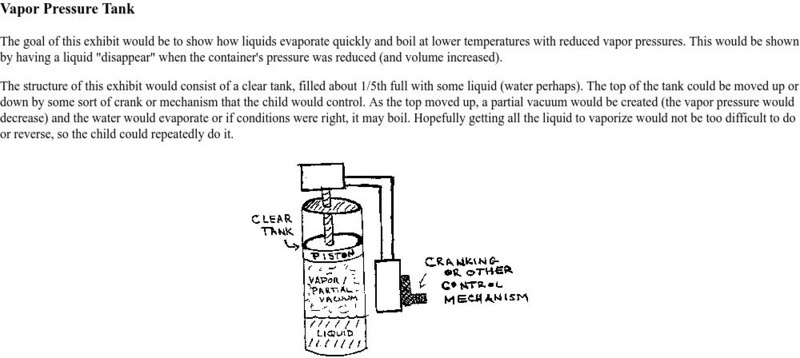

![Mc Rel: Water Cycle [Pdf] Unknown Type Mc Rel: Water Cycle [Pdf] Unknown Type](https://static.lp.lexp.cloud/images/attachment_defaults/resource/large/FPO-knovation.png)

